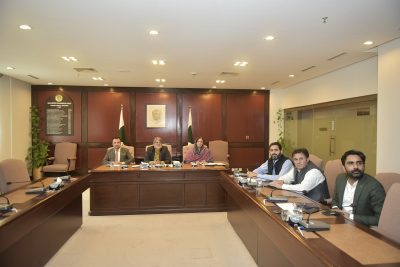
The senior leadership of the Pakistan Institute for Parliamentary Services (PIPS) convened a virtual training session with officials from the Zambian Parliament on Wednesday, August 7, 2024 to share experiential insights for establishing a Parliamentary Training Institute. Initially, a 10-member delegation from the Zambian Parliament, comprising 7 Members of Parliament and 3 functionaries, was scheduled to visit Pakistan for a 5-day capacity-building training program, but unfortunately, this plan was not realized due to unforeseen circumstances at the Zambian end.
The virtual training session was attended by PIPS’ senior officials, including Mr. Muhammad Rashid Mafzool Zaka, Executive Director; Ms. Samar Awais, Director General (Parliamentary Development Program); Mr. Haider Abbas, Director General (Finance); Mr. Muhammad Nazir, Director General (IT); Mr. Zahoor Ahmed, Deputy Director (IT); and Mr. Muhammad Rizwan Manzoor, Assistant Director (Research), who serves as the focal person for coordination with the Zambian Parliament. On the Zambian Parliament’s side, the training session was attended by secretariat officials led by Mr. Tennieson Nyangu, Director (Institute for Parliamentary Studies and Training).
Mr. Muhammad Rashid Mafzool Zaka, on behalf of the Pakistan Institute for Parliamentary Services (PIPS) and the Honorable Speaker/President of the PIPS Board of Governors, Sardar Ayaz Sadiq, extended a warm welcome to the Zambian delegates. He introduced the PIPS team participating in the training session and delivered a comprehensive presentation on the institute’s history, mandate, and operational framework. This included an overview of PIPS’ core values, curricula development methodologies, and knowledge sharing events organized for Honorable Members of Parliament and parliamentary functionaries. He deliberated on the research and legislative services of the Institute that how proactively, these services provides technical research assistance to the Honorable MPs and Parliamentary Committees under demand driven and anticipated modes. Mr. Zaka also elaborated on the composition of the PIPS Board of Governors and the crucial role of Honorable Members of Parliament in providing feedback and guidance to enhance the institute’s operations, under the leadership of the Honorable President of the PIPS Board of Governors. During his presentation, Mr. Zaka highlighted PIPS’ remarkable journey from a modest team of six members to a renowned institution. He showcased PIPS’ accomplishments and recognitions by esteemed global agencies, including:
Ms. Samar Awais, Director General (Parliamentary Development Program), elaborated on the operational mechanisms of the Parliamentary Development Program Wing at the Pakistan Institute for Parliamentary Services (PIPS). She outlined the various courses and workshops offered by the Institute to equip Honorable Members of Parliament and parliamentary functionaries with updated knowledge and toolkits, enabling them to conduct day-to-day business in a more informed manner. Ms. Awais briefed on the Institute’s comprehensive capacity-building programs for MPs, aligned with their four key mandates: representation, lawmaking, oversight, and budget making, aimed at strengthening parliamentary operations through informed decision making. She explained the structure and objectives of promotional and professional courses conducted at PIPS, highlighting the Institute’s efforts to transform the learning landscape by incorporating emerging technologies like AI and digital modes. Mr. Haider Abbas, Director General (Finance), added that PIPS collaborates with donor agencies, guided by the Institute’s Workplan, which serves as a roadmap for such partnerships. He also discussed the funding sources of PIPS.
The session was interactive, with Zambian Parliament functionaries posing questions that were responded to by the PIPS panelists. Mr. Tennieson Nyangu inquired about PIPS’ linkages with national and international organizations and how these collaborations benefit the Institute. Mr. Muhammad Rashid Mafzool Zaka, Executive Director, responded by citing PIPS’ Memoranda of Understanding (MoUs) with esteemed organizations such as the Inter-Parliamentary Union (IPU), Commonwealth Parliamentary Association (CPA), King Prajadhipok’s Institute (KPI), Thailand, and Institute for Parliamentarianism Kazakhstan (IPK). He highlighted how PIPS exchanges knowledge and expertise with these partner organizations.
In conclusion, Mr. Tennieson Nyangu, Director (Institute for Parliamentary Studies and Training), expressed his gratitude to the Pakistan Institute for Parliamentary Services (PIPS) leadership for a comprehensive and informative session. He commended the system and structure of the PIPS facility, acknowledging its effectiveness. In response, Mr. Muhammad Rashid Mafzool Zaka, Executive Director of PIPS, generously offered assistance to the Zambian Parliament in establishing their proposed Parliamentary Training Institute through virtual / in-person capacity-building sessions. He further proposed that PIPS is willing to facilitate engagement between the Honourable Members of the PIPS Board of Governors and their Zambian counterparts, who are responsible for establishing the proposed training facility. Mr. Zaka suggested that this Member-to-Member interaction could yield more productive and fruitful outcomes on the subject matter. The training session concluded with a commitment to proactively continue bilateral relations, with the aim of learning from each other’s expertise and experiences, thereby fostering a collaborative environment for mutual growth and development.